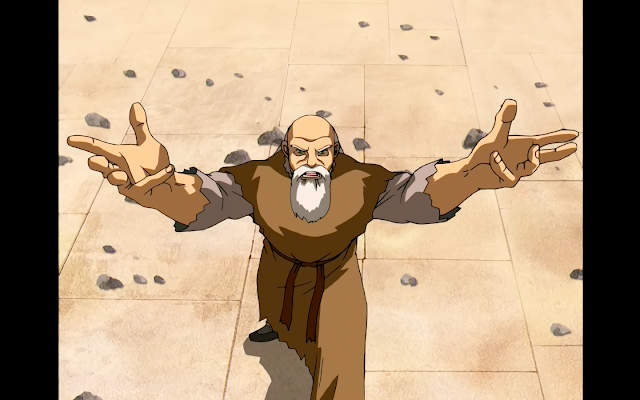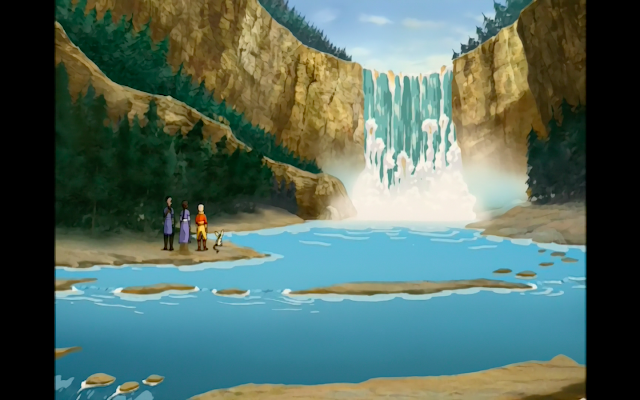Book 1, Chapter 6: Imprisoned
Taking a departure from the childish tone of the previous few episodes, Imprisoned focuses on the pain, suffering, and loss wrought by the fire nation. The creators chose to concentrate on one family's hardships, and this personal level definitely paid off in investing me.
In the opening scenes, the Gaang happens upon a mysterious earthbender who flees into the woods. Katara guesses that there must be a village nearby, and they follow him in search of food. Here's an aerial view of the beautiful earth kingdom village:
While shopping for food in the village square, Katara spots the timid earthbender and calls for Aang and Sokka to follow him into a shop.
"We saw you earth bending," Aang cheerfully says. Haru and his mother's reactions say a thousand words. Among them: fear, worry, panic, and sorrow.
"Fire nation. Act natural!" LMAO!
We learn that the fire nation uses slavery, extortion, and taxes to control the poor earth kingdom town. The fire commander threatens to burn down the mother's shop if she doesn't fork over double taxes. It's confirmed that the fire nation has captured all the earthbenders and uses them for slave labor.
Our up-close and personal perspective serves to drive home the extreme ruthlessness of the fire nation:
Now, I'm no expert on film techniques, but a few caught my eye that I'd like to share. While in the shop, Katara's face is framed against one of the overhead lights. This creates the illusion of a halo-effect or aura surrounding her face. I believe this to be an intentional technique used to represent her pure heart and Angel-like qualities. This is especially fitting because of Katara's bravery, self-sacrifice, and love displayed in this episode. It's Katara's episode after all.
Here is another interesting one! During his conversation with Katara, Haru earthbends two small rocks above his hand. I believe these rocks serve as a visual representation of his relationship with his father. Haru and his father were very close. He explains, "The only way I can feel close to my father now is when I practice my bending. He taught me everything I know." They revolved around eachother; they were eachother's whole world.
That is, until the fire nation invaded. As a way to emphasize his father's capture and his severed connection with him, Haru clenches his fist in order to break the rocks into sand. As a family unit, we are as strong as boulders. When seperated, we lose hope and break apart, only to drift away in the wind. The fire nation's most damaging act wasn't the taxes or the threats. The town could survive through that. No, they were so effective because they separated the earthbenders from their families. So sad 😢
In order to comfort Haru, Katara tells of her mother's death in a fire nation raid. This beautiful necklace is all she has left of her.
This part made me so angry. Haru saved the old man's life, how dare he turn him in? UGGGHHH!!
After learning of Haru's imprisonment, Katara devises a plan to follow him. It is quite an unbelievable plan at that, but it sure is entertaining! The following scene is one of my favorites, and it never fails to make me chuckle.
"That lemur! He's earthbending!"
***Cue Fire Nation Theme. What an ominous screenshot!
George Takei, famous for his role as Commander Sulu in Star Trek, does a fantastic job voicing the warden. One of the more famous guest VA's on Avatar, his voice is unmistakable.
"Simply treat me with the courtesy I give you, and we'll get along famously." Yeah, I'm convinced this is a reference to his fame. Why else is that word in the script? Why did he linger on it? I swear, the dialogue is PACKED with funny details.
Now lets get a little deeper. The following is a quote from this episode's Wiki page:
"George Takei and his family found themselves in a similar situation to the earthbending prisoners in this episode; during World War II, they were forced to relocate to a Japanese-American internment camp in Arkansas, and later transferred to another camp in California. Much like the villagers who were being imprisoned simply for being earthbenders, Takei and his family were forced into these camps simply for being of Japanese heritage."
Dammmnnnn...
Katara soon finds out that all of the POW's have given up on an escape plan, and that their only concern is to survive through the war. Katara's like, "Ain't nobody got time for that!"
Katara finds strength in hope. Her actions show that keeping an unbreakable mettle and maintaining unwavering courage is the true meaning of inner strength. So many others would have given up on the earth kingdom prisoners. Everyone else would have given up hope long ago. But Katara's greatest strength is reaching deep inside to not only give herself strength, but to also inspire others to do the same. In the darkest of times, hope is something you give yourself.
There are a few expositional choices that give away this episode as a children's show. The double appearance of the air vents is a pretty obvious one.
In a weird way, this screenshot is pretty cool. More abstract artwork comes to mind
Haruuuuuu!!! Remember when he spun the two rocks during his earlier conversation with Katara? This symbolism returns in a fantastic way that ties the story together.
Haru is now bending three rocks above his palm. Trinity. Whom does the third rock represent? Katara, of course! But what gives her this distinction? It was not only reuniting Haru and his father, it was giving them the courage to fight back. This scene is the very moment that Haru gathers the courage to stand his ground...
Tyro and Haru make a giant diamond from coal. Makes you wonder what other amazing earthbending moves we'll see in the future... :)
Here's a good example of how some of Avatar's animation is heavily influenced by Japanese anime. Some of the style blatantly slips. Interesting screenshot!
My favorite quote from this episode is actually spoken by Kevin Michael Richardson, Tyro's voice actor. His deep, commanding voice was made to deliver this badass line.
"Don't worry, I hear cowards float."
"All it took was a little coal," Katara says humbly. Obviously, that's only half the truth. While Katara, Sokka, and Aang gave the prisoners the means to help themselves, the greatest lesson was that the coal wasn't what impacted them the most. It was what she said during her speech, "It is your courage they should truly fear, for it runs deeper than any mine you've been forced to dig, any ocean that keeps you far from home." Although it didn't visibly stir anyone at the time, it undoubtedly sparked their inner fire; they were primed and ready when the chance came to escape. Katara's greatest gift was inspiring the prisoners to hope again.
The episode ends with Zuko finding Katara's necklace. Am I the only one that realizes we're talking about a kids show, and a piece of jewelry is given unusual importance? The necklace has no special powers. It doesn't shoot laser beams, it doesn't signal anything, and it's practically worthless on the market. Hmmmmm.
Conclusion: Imprisoned, while slightly bogged down from some childish exposition and minor plot conveniences, is a good episode overall. I found the personal focus on Haru's family to be touching. They could have easily just showed tons of random, oppressed earthbenders, but I probably wouldn't have felt for them. The symbolism and certain "film techniques" on display were much appreciated. They were smart and enhanced my viewing experience, specifically now as an adult. This show will never cease to amaze me.
I rate Imprisoned a 7.5/10.
Yes, this is a "good" rating. 7-7.5 is good, 8-8.5 is great, 9-9.5 is excellent, and 10 is just about perfect, or as close to "perfect" as animation can get. A 10 means the physical animation was stellar, the dialogue was riveting, everything that needed to be accomplished story-wise was done beautifully and convincingly, and of course many other factors. I'm happy to say that ATLA amazingly reaches that gold standard often in the later seasons. In my mind, I'm trying to be as objective as possible, but I know that can be FAR from the truth! Let's face it, on some episodes it won't be possible for me to stay objective! That's why this is my OPINION. As much as I'd like to, I can't pretend these are going to represent the true "grade" or "worth" of an episode. Honestly, I'm only grading them because of my weird need to categorize and rank things... Lol.
That being said, I just want you to know that I'm not some random guy gushing about his "favorite" show and trying to "hype" it up too much. No, I'm familiar with great works of film and animation, and I know greatness when I see it. I've watched this show 4 times, and I've invested a lot of time and research to be as accurate and insightful as possible. In addition to taking a multi-directional approach in my thinking, I've taken a lot of careful consideration into account for these ratings. I'm not here to pretend that ATLA is something it's not. I'm interested in Truth and nothing else. Because make no mistake about it, there is greatness around every turn. Things unfold and connect in ways that would blow your mind. My hope is that I can wake you up to it.
At the end of Book 1, I might write a separate post on my favorite episodes and moments within them. (EDIT: I did! You can check that out after the last episode of Book 1, entitled "The Gallery {Exhibit 1: Water}." I'm proud of how it turned out :)
I hope you enjoyed this episode, and until next time, peace ☮.

























Comments
Post a Comment